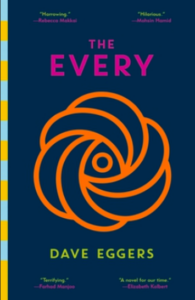
Dave Eggers’s bestselling tech dystopia, The Circle (2013), has finally received a sequel. While The Circle described the rise of a fictitious tech and social media company and its protagonist’s steady descent into the maelstrom of surveillance culture, The Every now picks up a couple of years later, after the Circle has acquired a big online retailer “named after a South American jungle.” The resulting mega corporation, called the Every, is pretty much the monopolist in all things digital tech – from apps to online shopping to cutting edge hardware. Of course, it’s every bit as scary and unlikeable as one would imagine it to be.
Readers of The Circle will feel quite at home in the world of The Every. Eggers makes sure to pepper his story with nods and hints at its predecessor, and several central characters (Mae, Bailey, Francis) make a comeback. However, The Every is in important ways a departure from the earlier novel. Shot through with dark humor, Eggers’s voice here takes on a satirical aloofness that at times even brings to mind his caustic Trump satire, The Captain and the Glory (2019).
Consequently, one of the novel’s predominant forms of critique is ridicule. Eggers’s device to tease out the absurdities of the ‘Everyones’ and their collective wisdom is simple, but effective: once more, he brings in a newbie (a young woman named Delaney) through whose eyes we observe and learn about life at the company. The essential twist that provokes some of the absurdest plot developments is that Delaney, unlike Mae before her, sneaks her way into the heart of the Every with a specific goal in mind: to take down the entire enterprise. Her plan is to pitch one outrageous business idea after another until, finally, the public would see the company as the quasi-totalitarian behemoth that it really is. It’s not difficult to guess what happens: the Every implements each and every one of Delaney’s ideas, and of course the customers love, rather than abhor, them.
The company’s thrust is to create an always-online, algorithmically organized, and perfectly monitored social environment, and Delaney’s well-meant interventions unintentionally help this mission along. What makes The Every really stand out among the crowd of tech-critical fiction, however, is that it moves beyond the issue of corporate surveillance right into the realm of present-day politics. Taking on the highly topical subject of free speech and freedom of conscience in the face of cancel culture, the story thinks beyond the question of the ‘medium’ of control and imagines the specific ‘doctrine’ that a digital panopticon in the 21st century might perpetuate.
In one of the novel’s key scenes, Delaney organizes a day trip for her coworkers to watch some elephant seals on a beach. From the moment the invitations are out to after the actual trip, the whole episode is one fantastically comical, densely scripted illustration of the loss of innocence that accompanies radical progressivism, pushed to extremes. Neither the chosen means of transportation nor the menu choices, nor even the music played during the ride survives the scrutiny of an audience always attempting to find ways in which this thing or another is “complicit in evil committed or implied.” The day trip reaches its climax in a flurry of negative online comments, written on the bus ride back:
The complaints, both signed and anonymous, … were universally apocalyptic. … Inappropriate at best, one said, thinking herself the most reasonable. A top-to-bottom atrocity, said the next. There was soon a thread about how perhaps Welcome2Mes in general should be discontinued. And field trips. And forest rangers. And parking lots. Something about parking lots got the Everyones to a higher plane of anguish, and the weeping began. The crimes of the world being too many and too cruel, and parking lots being somehow entwined with the worst of these crimes, the bus erupted in wailing and consoling-without-touching.
The Every continually confronts us with what seems, eerily, an only slightly exaggerated version of our own society. Trigger-happy, finger-wagging, and undeniably morally superior, the ‘Everyones’ may at times even feel uncomfortably close to home for many readers. In this respect, Eggers’s latest novel is no mere update of the tech critique offered by its predecessor. The Every dares to tackle a whole set of new and quite controversial topics of our age that have little to do with the technological wrapping that they come in. Reading in part like a satirical essay (rather than a dystopian thriller), it seems an important novel for our time, and a deliciously enjoyable one at that.
8,928 Total Views, 4 Views Today






